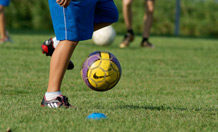
Playing football has major health benefits.
Could football give homeless men a health kick?
Playing street football two or three times a week could halve the risk of early death in homeless men.
Research led by the Universities of Exeter and Copenhagen shows the positive impact of street football on the fitness of homeless people, a group with typically poor health and low life expectancy.
Homeless people face a much lower-than-average life expectancy, usually as a result of cardiovascular disease. This is thought to be partly down to low aerobic fitness and high levels of hypertension and the fact that homeless people are, on average, more likely to smoke and misuse alcohol and other drugs. While homeless people tend to undertake large amounts of low-intensity physical exercise, through more than 10,000 daily steps of walking, most do not take part in more intensive exercise.
To address this problem, charities and government agencies have tried schemes such as offering gym memberships to homeless people.
For this study, 55 homeless men living in Copenhagen were included in a control group or invited to attend four-a-side football training sessions three times a week for 12 weeks. By the end, the aerobic fitness of the football-playing group was improved and their cholesterol, body fat and blood pressure reduced.
The footballers’ average maximal oxygen uptake was increased 11 percent (four ml/min/kg bodyweight). Previous scientific studies have suggested that the risk of death decreases by around 50% through this increase in maximal oxygen uptake. Body fat was reduced by an average of 2.5 per cent and LDL-cholesterol by 6.4 per cent.
Lead author Professor Peter Krustrup of the University of Exeter said: “Street football for homeless men is very intense and 12 weeks of training significantly improves the fitness and cardiovascular health profile of these men. We also observed a very high attendance rate, which is promising for future adherence to physical activity.
“Football seems to be a great type of fitness training for most people. Not only does it encourage varied, intense training, it is social and it can be played anywhere.”
Collaborating researcher, Professor Merete Nordentoft of the Psychiatric Center Copenhagen, University of Copenhagen, concludes: “There seems to be great potential for improving the quality of many people’s lives if local agencies could organise street football groups for homeless people.”
The study Short-term Street Soccer Improves Fitness and Cardiovascular Health of Homeless Men is published in the European Journal of Applied Physiology.
Date: 3 October 2011
